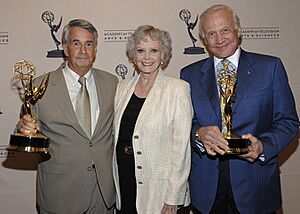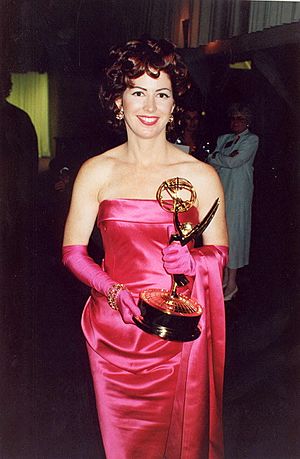Emmy Awards facts for kids
Quick facts for kids Emmy Awards |
|
|---|---|

Emmy Awards logo.
|
|
| Presented by | ATAS/NATAS/IATAS |
| Country | United States |
| First awarded | January 25, 1949 |
The Emmy Awards, or Emmys, are super important prizes given to people who make amazing TV shows! Think of them like the Oscars for movies or the Grammys for music, but all about television. These awards celebrate the best actors, writers, directors, and everyone else who works hard to create the TV programs you love to watch.
There are many different Emmy ceremonies throughout the year. Each one focuses on a specific type of TV show. The most famous ones are the Primetime Emmy Awards, which honor shows you watch in the evening, and the Daytime Emmy Awards, for shows that air during the day. There are also special Emmys for kids' shows, sports, news, and even international programs!
The shiny Emmy trophy looks like a winged woman holding an atom. It's named after "immy," a nickname for a special part of old TV cameras. Winning an Emmy is a huge honor in the television world!
These awards are given out by three different groups: the Academy of Television Arts & Sciences (ATAS), the National Academy of Television Arts & Sciences (NATAS), and the International Academy of Television Arts & Sciences (IATAS). Each group handles different types of Emmy awards. The first Emmys were given out in 1949 in Los Angeles, and they quickly grew to celebrate TV shows all across the country and even around the world.
Contents
- The Story Behind the Emmys
- The Emmy Trophy: A Closer Look
- Different Kinds of Emmy Awards
- Primetime Emmys: Evening Entertainment
- Daytime Emmys: Shows for Your Day
- Sports Emmys: Celebrating Athletic Feats
- News and Documentary Emmys: Telling Important Stories
- Children's and Family Emmys: Fun for All Ages
- Engineering Emmys: The Tech Behind TV
- Regional Emmys: Local TV Stars
- International Emmys: Global TV Excellence
- Student Emmys: Future TV Talent
- Special Recognition Awards
- See also
The Story Behind the Emmys

The Emmy Awards started in Los Angeles, California, to celebrate the growing world of television. The very first Emmy ceremony happened on January 25, 1949. Back then, it only honored shows made and shown locally in the Los Angeles area. A person named Shirley Dinsdale won the first-ever Emmy for being the "Most Outstanding Television Personality."
The name "Emmy" comes from "Immy," which was a nickname for a special tube called an "image orthicon tube" used in early TV cameras.
In the 1950s, the Emmys became a national event, celebrating shows seen all over the United States. As TV grew, a new group called the National Academy of Television Arts & Sciences (NATAS) was formed in New York City in 1955. This group helped create local Emmy awards for shows made in different parts of the country.
Over time, more specific Emmy awards were created. For example, the first Daytime Emmy ceremony, just for daytime shows, was held in 1974. The International Emmy Awards, which honor TV shows made outside the U.S., also started in the early 1970s.
In 1977, the two main Emmy groups, ATAS and NATAS, decided to work separately but still share the Emmy name and trophy. Each group now focuses on different sets of awards. For example, the ATAS handles the Primetime Emmys, while the NATAS handles the Daytime, Sports, and News & Documentary Emmys.
As streaming services became popular, the rules for Emmys changed. In December 2021, the ATAS and NATAS made big updates to how shows are categorized. Now, awards are based more on the type of show and its themes, rather than just when it airs. For example, most scripted dramas and comedies moved to the Primetime Emmys. All children's shows now have their own special awards called the Children's & Family Emmy Awards.
The Emmy Trophy: A Closer Look
The famous Emmy trophy shows a winged woman holding an atom. A television engineer named Louis McManus designed it, using his wife as his model! The Emmy groups loved his design in 1948 after looking at many other ideas.
The statue represents the goals of television:
- The wings show the "muse of art" – meaning creativity and inspiration.
- The atom represents the "electron of science" – meaning technology and innovation.
When they were choosing a name, someone suggested "Ike," after a part of old TV cameras. But that was also the nickname of a famous general, Dwight D. Eisenhower, who later became president. So, they wanted something different. Another engineer, Harry Lubcke, suggested "Immy," which was a common term for a camera tube. They liked "Immy" and then changed it to "Emmy" to sound more like the female statue.
The Emmy trophies are not all the same size or weight. A Primetime Emmy trophy weighs about 6 pounds and 12.5 ounces (around 3 kilograms) and stands about 15.5 inches (39 cm) tall. They are made from copper, nickel, silver, and gold. It takes about five and a half hours to make each one! Workers even wear white gloves to make sure no fingerprints get on the shiny surface.
The groups that own the Emmy trademark have strict rules about using the Emmy image and name. For example, the Emmy statue must always face left in pictures. If you win an Emmy, you need permission to use the statue's image for promotions.
Different Kinds of Emmy Awards
There are many different Emmy competitions held throughout the year. Each one has its own rules and categories. It's important to know that a show usually can't enter more than one Emmy competition. For example, a show can't compete for both a Daytime Emmy and a Primetime Emmy.
| Group Giving the Award | What They Award |
|---|---|
| ATAS | Primetime, Creative Arts, Primetime Engineering, Los Angeles Area, College TV |
| NATAS | Daytime, Daytime Creative Arts, Children's & Family, Sports, News & Documentary, Technology & Engineering, Regional (except Los Angeles), National Student Production |
| IATAS | International |
A show is considered "national" if it reaches more than half of the homes in the U.S. If it reaches fewer homes, it might be eligible for a Regional Emmy instead. Even if you win an Emmy from a smaller competition, you are still called an "Emmy Winner"!
Primetime Emmys: Evening Entertainment

The Primetime Emmys celebrate the best in American TV shows that air in the evening. The main ceremony usually happens in mid-September. It's broadcast on major TV networks like ABC, CBS, NBC, and Fox, which take turns hosting it.
Some awards for people working behind the scenes, like art directors, costume designers, and cinematographers, are given out at a separate event called the Creative Arts Emmys a few days earlier.
Members of the ATAS vote for these awards. They choose nominees and then the final winners.
Daytime Emmys: Shows for Your Day

The Daytime Emmy Awards honor excellent American TV shows that air during the day. The awards ceremony traditionally took place in May or June, but in 2025 it moved to October. The first separate show just for daytime programs was held in 1974.
Just like the Primetime Emmys, there's a separate Creative Arts Emmy ceremony for the talented people who work behind the scenes on daytime TV.
Members of the NATAS vote for the Daytime Emmys. Judges are experienced professionals in the TV industry.
Sports Emmys: Celebrating Athletic Feats
The Sports Emmy Awards are given by the NATAS to celebrate the best in sports programming. The ceremony happens every spring, usually sometime in April or May, in New York City.
Experienced people in national sports production serve as judges. They vote to pick the nominees and then the winners.
News and Documentary Emmys: Telling Important Stories
The News & Documentary Emmy Awards are presented by the NATAS. They honor excellent national news and documentary shows. The awards ceremony traditionally took place every fall, but in 2025 it moved to June.
Judges are experienced professionals in news or documentary reporting and production. They vote in different rounds to choose the best entries.
Children's and Family Emmys: Fun for All Ages
The Children's & Family Emmy Awards started in 2022. These awards celebrate the best in children's and family TV shows. Before 2022, many of these shows competed in the Daytime or Primetime Emmys.
The NATAS created this new ceremony because there has been a huge increase in children's and family programming. This change helps make sure these special shows get the recognition they deserve!
Engineering Emmys: The Tech Behind TV

The Primetime Engineering Emmy Awards (from ATAS) and the Technology & Engineering Emmy Awards (from NATAS) are two separate awards. They honor people, companies, or groups who have made big improvements and contributions to the technology side of television.
These awards celebrate the smart engineers and scientists who make TV possible and keep it getting better!
Regional Emmys: Local TV Stars
There are 20 regional Emmy chapters across the United States. These chapters give out awards to celebrate excellent local TV shows, including local news and programs made in specific states or cities.
Most of these regional chapters are part of the NATAS. The Los Angeles area has its own regional awards run by the ATAS. If a show is only seen in less than half of U.S. homes, it usually competes for a Regional Emmy.
These awards are very important for recognizing the hard work of local TV professionals!
| Regional Chapter | States Covered |
|---|---|
| Boston / New England | Maine, Massachusetts, New Hampshire, Rhode Island, Vermont, and most of Connecticut |
| Chicago / Midwest | Parts of Illinois, Indiana, and Wisconsin |
| Highlands Ranch / Heartlands | Colorado, Wyoming, Kansas, Oklahoma, and parts of Nebraska |
| Dallas / Lone Star | Texas and parts of New Mexico |
| Los Angeles (ATAS) | Greater Los Angeles only |
| Brecksville / Lower Great Lakes | Parts of Indiana, Ohio, and Pennsylvania |
| Southfield / Michigan | Michigan |
| Arkansas / Mid-America | Arkansas, Iowa, Missouri, and parts of Illinois and Louisiana |
| Delaware / Mid-Atlantic | Delaware, most of Pennsylvania, and parts of New Jersey and Ohio |
| Nashville / Midsouth | The Huntsville, Alabama TV market; all of North Carolina (except the Asheville TV market); Tennessee |
| Maryland / National Capitol/Chesapeake Bay | Maryland, Virginia, and Washington, D. C. |
| New York / New York | New York and parts of Connecticut and New Jersey |
| Alaska / Northwest | Alaska, Idaho, Montana, Oregon, and Washington |
| Kentucky / Ohio Valley | Kentucky, West Virginia, and parts of Indiana and Ohio |
| San Diego / Pacific Southwest | Most of Southern California (except Greater Los Angeles) and parts of Nevada |
| Rocky Mountain / Southwest | Arizona, Utah, most of New Mexico, and Imperial County, California |
| San Francisco / Northern California | Northern California, Hawaii, and parts of Nevada |
| Atlanta / Southeast | Mississippi, South Carolina, most of Alabama and Georgia; The Asheville, North Carolina TV market |
| Suncoast | Florida and parts of Alabama, Louisiana, and Georgia |
| Minnesota / Upper Midwest | Minnesota, North Dakota, South Dakota, and parts of Nebraska and Wisconsin |
International Emmys: Global TV Excellence
The International Emmy Awards celebrate amazing TV shows made outside the United States. The IATAS has presented these awards every year since 1973. The ceremony usually takes place in November in New York City.
Any TV show made outside the U.S. can be submitted, even if the creators are not members of the IATAS.
Student Emmys: Future TV Talent
The College Television Awards are given by the ATAS to celebrate excellent TV projects made by college students. Students can submit their work in categories like Comedy, Documentary, Drama, and News.
Similarly, the National Student Production Awards are given by the NATAS to celebrate great work by high school students. Students can submit their productions in news, craft, and programming categories. These awards encourage young talent in television!
Special Recognition Awards
- The Governors Award (from ATAS) and the Trustees Award (from NATAS) are the highest honors. They celebrate individuals or groups who have made a huge, lasting impact on television.
- The Bob Hope Humanitarian Award is given by the ATAS Board of Governors to someone in the TV industry who has done amazing humanitarian work to help society.
- The Public Service Award recognizes public service announcements and programs that help "advance the common good."
See also
 In Spanish: Premios Emmy para niños
In Spanish: Premios Emmy para niños
- List of Daytime Emmy Award winners
- List of Primetime Emmy Award winners
- List of International Emmy Award winners
Other similar awards
- List of American television awards
- British Academy Television Awards (UK)
- National Television Awards (UK)
- Screen Actors Guild Award
- Streamy Awards
- Directors Guild of America Award
- Producers Guild of America Award
- Writers Guild of America Award
- TCA Awards
- Canadian Screen Awards – film and television industry awards in Canada
- Logie Awards – television broadcasting industry awards in Australia
- CableACE Award – a past award for Cable TV shows
- ITA Awards ( India)
 | Jewel Prestage |
 | Ella Baker |
 | Fannie Lou Hamer |




